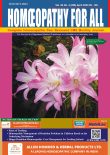Homoeopathy as a First-Line Treatment: An Emerging Paradigm in Healthcare
Keywords:
minimizing toxicity, Clinical Efficacy, scientificAbstract
Homoeopathy, a system of alternative medicine founded by Samuel Hahnemann in the late 18th century, is gaining traction as a viable first-line treatment option worldwide. This article examines the foundational principles, clinical efficacy, and increasing acceptance of homoeopathy within modern healthcare, especially in primary care contexts.
Downloads
References
1. Hahnemann, S. (1810). Organon of Medicine (5th ed.). Translated by William Boericke. New York: Boericke & Runyon.
2. Vickers, A. J., & Zollman, C. (1999). "ABC of complementary medicine: Homeopathy." BMJ, 319(7214), 1098-1101.
3. Ernst, E. (2002). "A systematic review of systematic reviews of homeopathy." British Journal of Clinical Pharmacology, 54(6), 577-582.
4. Cucherat, M., Haugh, M. C., Gooch, M., & M. M. (2000). "Evidence of the efficacy of homeopathy: A meta-analysis of clinical trials." Homeopathy, 89(3), 193-199.
5. Jacobs, J., & Jonas, W. B. (2002). "Homeopathy for asthma: A systematic review." Journal of Alternative and Complementary Medicine, 8(5), 677-685.
6. Thomas, K. J., & Coleman, P. J.
(2006). "The role of homeopathy in primary care." British Journal of General Practice, 56(525), 283-286.
7. World Health Organization. (2019). "WHO Global Report on Traditional and Complementary Medicine 2019." Retrieved from [WHO website](https:// www.who.int/publications/i/ item/9789241515436).
8. Mehl-Madrona, L., & Mainguy, B. (2003). "The efficacy of homeopathy: A systematic review." Alternative Therapies in Health and Medicine, 9(6), 56-62.
9. Bell, I. R., & Koithan, M. (2010). "Homeopathy: a new model for the practice of integrative medicine." Alternative Therapies in Health and Medicine, 16(3), 18-21.
10. Kahn, J. (2014). "The role of homeopathy in the treatment of chronic diseases." Homeopathy, 103(2), 137-143.




